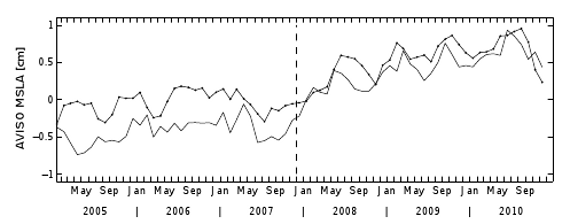Ocean Cooling Corrected, Again
Posted on 28 July 2011 by Rob Painting
The ongoing difficulty of accurately measuring the Earth's ocean heat content has led to premature "skeptic" claims about ocean cooling. A recent paper Von Schuckmann & Le Traon (2011) put the kibosh on ocean cooling claims. They find that from 2005 to 2010 the global oceans (10 to 1500 metres down) have continued to warm, although they caution that their result is based on the assumption that there are no more systematic errors in the data gathered from ARGO floats which measure ocean heat.

The more (data), the merrier
The ARGO float network began rollout in 2000, but prior to 2005 there wasn't sufficent global coverage, and because of this Von Schuckmann and Le Traon (2011) start their analysis from 2005 onwards. The authors found that only after November 2007 (when ARGO was 100% complete) is the ARGO network sufficiently robust to give accurate short-term trends of what they term 'global ocean indicators'. This being steric sea level changes (sea level rise from thermal expansion as the oceans warm), heat content, and ocean salinity. This is probably best illustrated in the figure below, where the authors apply their method of analysis to the satellite sea surface height (SSH) data (AVISO):

Figure 2 -Method validation using gridded altimeter SSH measurements (AVISO): gridded SSH during 2005–2010 has been subsampled to the Argo pro?le position and the simple box averaging method has been applied. Global mean SSH derived from the AVISO grid (bold line) is compared to its corresponding subsampled result.
The two lines represent the satellite data and a subsampled set using the position of the ARGO float profiles and the authors 'box averaging' method - a method to account for the irregular distribution of ARGO floats in the ocean, and missing and spurious (faulty) data. After 2007 (vertical dashed line), when the ARGO installation is complete, it is obvious that both sets show greater agreement. This highlights how sensitive the short-term trends are to the number of ARGO floats in the network.
Errors reduce as the length of observation increases
Von Schuckmann & Le Traon (2011) also estimate the errors in global trends from the period analysed, and also future error uncertainty. For the 2005-2010 period the error uncertainty is plus/minus 0.1 watt per square metre; quite large considering the global trend over the period is 0.55 watts per square metre. However, after 15 years of observations the uncertainty drops considerably, down to ± 0.02 watts per square metre. This demonstrates how longer periods of observation, along with the complete ARGO network, are critical to derive more accurate long-term ocean trends.
Ocean warming in context
The warming trend observed is slightly smaller than that seen in Von Schuckmann (2009), where the authors measure down to ocean depths of 2000 metres, and found a warming trend of 0.77 ±0.11 watts per square metre. However, it completely refutes a recent (2010) skeptic paper which suggested the oceans were cooling, based on the upper ocean down to 700 metres. Clearly much heat is finding it's way down into deeper waters. And although small in comparison, the deep ocean is gaining heat too.
Upper ocean warming (0-700mtrs) is slower than that observed during the 1990's, but the oceans are still gaining heat. Indeed, the slow-down is to be expected if recent papers on increased reflective aerosols in the atmsophere are correct.
Conclusion
The ARGO network was completed in November 2007, and only since then has the network been able to provide more robust short-term trends. Over the period 2005-2010 the oceans (10-1500 meters down) have warmed 0.55 watts per square meter, but error uncertainty is almost 20%. Uncertainty will reduce as the length of the observational record increases, but Von Schuckmann and Le Traon (2011), caution that this is provided no more systematic errors remain in the network.































 Arguments
Arguments























 0
0  0
0 [Source]
Additionally, I'm not sure what you believe qualifies you to question or refute the findings of Von Schuckmann & Le Traon (2011), especially if you cannot get the basics correct.
[Source]
Additionally, I'm not sure what you believe qualifies you to question or refute the findings of Von Schuckmann & Le Traon (2011), especially if you cannot get the basics correct.




 Seems a tad more direct than relying on sea level budget estimations.
Seems a tad more direct than relying on sea level budget estimations.







Comments